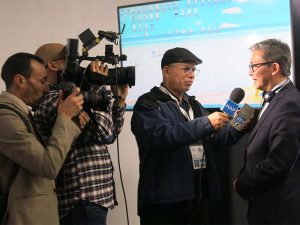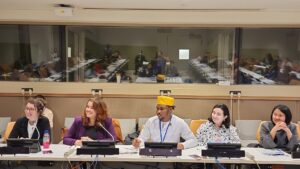 23 November 2018, Marrakesh, Morocco – Local governments need to strengthen data collection, increase their revenues and improve technical capacity according to participants in a session on innovative experiences in local finance during the third day of the flagship Africities8 summit.
23 November 2018, Marrakesh, Morocco – Local governments need to strengthen data collection, increase their revenues and improve technical capacity according to participants in a session on innovative experiences in local finance during the third day of the flagship Africities8 summit.
The head of UN-Habitat’s Urban Economy and Finance Branch, Marco Kamiya, opened the session, organized by Morocco, UN-Habitat and United Cities and Local Governments (UCLG) on Innovative Experiences in Local Finance calling for governance, rules and regulations, urban planning and finance to come together.
“To achieve sustainable development we need to plan in advance, at scale and in phases as our decisions today will impact the next decade,” said Mr Kamiya.
Mayors and experts in municipal and city finance from Tunisia, Burkina Faso, South Africa, Mozambique, Somaliland and Nigeria described their innovative practices and policies.
 The meeting covered various aspects including the need for the autonomy of local government, the importance of partnerships and involving the local community, the role of private sector in tax collection and uses of technology.
The meeting covered various aspects including the need for the autonomy of local government, the importance of partnerships and involving the local community, the role of private sector in tax collection and uses of technology.
A session on “Overcoming the loss of Urban Green and Public Spaces in Africa”, organised by UN-Habitat, the City of Johannesburg, South African Cities Network, the Centre for Future of Places and the International Council for Local Environmental Initiatives was chaired by Mohamed Sadiki, the Mayor of Rabat.
Dr. Collins Adejei Mensah of the University of Capetown explained the causes of the loss of urban green and public spaces in Africa included rapid urbanization and lack of implementation of planning regulations. He called for consensus building and meaningful community participation.
UN-Habitat’s Laura Petrella said it was important to make an inventory of public spaces to support city leaders in deciding where to invest. Participants agreed public spaces should be embedded in national and local government policies, there should be a pan-African network of learning and implementing partners on the issue and to support further research on the benefits of public space.
During the closing session on “Urbanization and National Development”, UN-Habitat’s Omoayena Odunbaku, called for governments to support innovative ideas, symbiotic learning and capacity development and mainstream urbanization in national development plans.”


